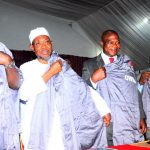
The true story about hijab in Osun – Niyi Akinnaso
This story is not for those with rigid views about the culpability of the Osun State Governor, Rauf Aregbesola, for the so-called hijab crisis in Osun schools. The goal is not to convince, but to educate, them and others about hijab wearing by female students in Osun schools. I tell the story from three perspectives.

First, I have spent about 20 years in Osun State, primarily at Ilesa and Ile-Ife, and have travelled across the entire state over the years. Ever before Aregbesola became governor, I encountered hijab-wearing female students in both Muslim and Christian schools in different parts of the territory now known as Osun State. True, there have been periodic arguments about hijab in the schools, but never have such arguments overshadowed discussions about education in the state, where there are more serious problems to be solved. It is most unfortunate that Aregbesola’s well-intentioned intervention has now been turned on its head over hijab, which is now being used as a whip to “flog” him with.
Second, I have known the Aregbesola ancestral family in Ilesa since my Higher School Certificate days in Ilesa Grammar School in the 60s. The Aregbesola lineage is made up of both Christians and Muslims. I also know Governor Aregbesola’s own nuclear family quite well. Both he and his wife are Muslims. I know that his wife does not wear hijab. Nor does his daughter. I wonder why and how he could Islamise a whole state, when he comes from a family of Christians and Muslims.
Third, I also know a lot about the educational programme being implemented in Osun by Aregbesola. I reviewed the programme at inception and have written about it on this column. Two central features of the programme are the re-classification and restructuring of the schools, primarily to separate elementary grades 1-4, the beneficiaries of the school feeding programme, from the rest of the elementary grades, which are then merged with the JSS grades 1-3 to form the Middle school in the re-classification. The SSS grades 1-3 are then constituted into High School in the re-classification.
It was this re-classification that led to the restructuring of schools, which in turn led to the merging of some schools and the building of mega schools to accommodate the merged populations. Aregbesola was, however, careful to ensure that Muslim and Christian schools were not merged. Rather, Muslim schools were merged only with Muslim schools, while Christian ones were merged only with their Christian counterparts.
Baptist High School, Iwo, is the site of one of such mergers, adding on students from four other Christian schools, namely, Baptist Secondary School, United Methodist, St. Mary’s, and St. Anthony’s. The last three of these schools had hijab-wearing female students before the merger.
True, Aregbesola never ordered the use or non-use of hijab in Osun schools, the merger of hijab- and non-hijab wearing schools made Baptist High School a site of contestation over hijab, the Christian affiliations of the five schools notwithstanding.
Whether blown up or not by the press, the hijab issue is a lesson for all politicians. In plural societies, cleavages between groups could be exploited for political gain. In societies, like Osun with shared history, culture, and language, religious differences assume greater importance than usual. In Osun today, hijab has been elevated to the highest level as a symbol of religious differences.
There have been two major occasions for this elevation. The first occurred in 2013/14 as the contest for the governorship election took off. At that time, political opponents took as much mileage as they could over a concocted hijab crisis. The second occasion followed a recent court judgment which validated the wearing of hijab. On both occasions, some Christians brainwashed or pressurised a few students to wear Christian robes to school, and even monitored the teachers’ reactions. It all happened in the same Baptist High School, Iwo.
On this second occasion, however, a second school was involved. At the Christ African Middle School, Osogbo, some female Muslim students were prevented from participating in school activities because they wore hijab in the attempt to enforce the court judgment. Muslim leaders quickly intervened and brought the situation under control.
How and why commentators quickly extrapolated from incidents in one or two schools to the entire state says a lot about the state of journalism in this country. True, there are genuine questions to be raised about the dividends of Aregbesola’s investment in education in the state. It is, however, unfortunate that the press would wait for a uniform crisis to raise those concerns.
It is even more worrisome that protests by a few students in one or two schools, at the instigation of their parents or politicians, could be used to anticipate violence of the scale of Boko Haram insurgency and pipeline vandalism by the Niger Delta militants.
It is equally shameful that some parents or guardians would push or pressurise their children or wards to protest hijab and not substantive educational problems. It is particularly worrisome that Christian leaders would take the law into their own hands instead of taking a leaf from their Muslim counterparts’ book, by appealing the court judgment, which they considered favourable to Muslims.
I have always been sceptical of a press that stokes the fire of disunity, instead of seeking ways of educating the public properly and making opposing sides of a sensitive issue, such as religion, see reason.
This is not to say that there have not been useful suggestions in the commentaries. For example, Aregbesola has been advised to turn over the Christian schools to their missionary owners. However, such an armchair suggestion is not based on what obtains on the ground in Osun today. The strides taken so far with the reclassification and restructuring of Osun schools have gone so deep that reversing the trend will be a huge waste of state resources. Besides, from my knowledge of similar steps in the United States, it often takes years for the dividends of such investment to begin to show.
Finally, Osun parents will contribute more to their children’s education when they work hand in hand with the government and the school teachers to resolve conflicts in the schools. If such attempts fail, there is always the court of law.
Source : Punch Newspaper



